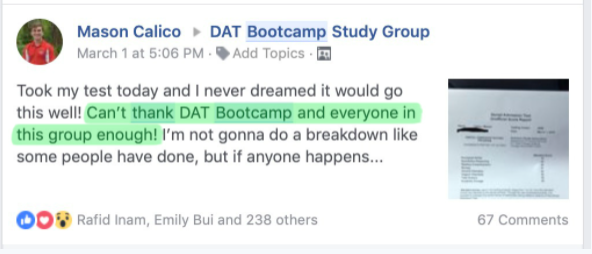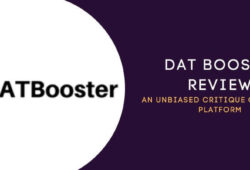The DAT Quantitative Reasoning section seems exhausting. It requires a lot of attention, and it’s the last part of the whole test.
However, we know some strategies that can help you feel confident and smart even at the end of the exam.
In this article, we outline an overview of this section while also providing tips on how to study for it.
Quick Summary
- Qualitative Reasoning is one of the DAT sections.
- This part tests your mathematical and arithmetical skills.
- You’ll have 45 minutes to answer 40 multiple-choice questions.
- You’ll have access to a basic four-function calculator.
What is DAT Quantitative Reasoning?
Quantitative Reasoning is the last part of the DAT exam, coming right after Reading Comprehension. This section tests your arithmetic and mathematical skills.
Quantitative Reasoning is one of the four parts of the Dental Admissions Test, known as the DAT.
To pass it successfully, you need to develop your time-management skills and be able to manipulate numerical relationships and reason with numbers.
How is DAT Quantitative Reasoning Structured?
The Quantitative Reasoning section includes 40 multiple-choice questions divided into the following categories:
- Algebra has nine questions on equations and expressions, inequalities, exponential notation, absolute value, ratios and proportions, and graphical analysis.
- Numerical Calculations include six questions on fractions and decimals, percentages, approximations, and scientific notation.
- Conversions include questions on temperature, time, weight, and distance.
- Probability and Statistics have four questions, which include Quantitative Comparison, Data Sufficiency, and Statistical Analysis.
- Geometry has four questions. This section includes the basics of the subject.
- Trigonometry includes four questions. This section includes the basics as well.
- Word Problems have ten questions.
The whole section lasts 45 minutes. This means you won’t have much time to think it over. So you’ll need to be quick enough to complete this part.
You’ll also access a basic four-function calculator on the computer screen. Beware, it can’t perform complex functions. We don’t recommend using it too much, as typing numbers on it is time-consuming.
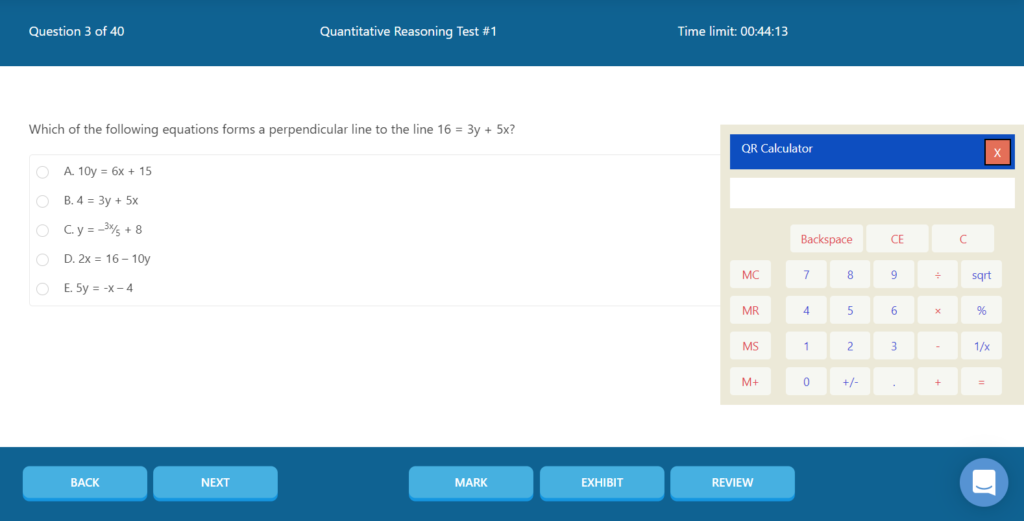
Beware that Quantitative Reasoning is the only section you’ll have a calculator. Thus doing calculations manually is beneficial while writing the whole test.
How to Study for DAT Quantitative Reasoning
Dentistry requires a deep knowledge of math. Here are some ways to improve your knowledge in this field:
1. Math Isn’t As Intimidating As It May Seem
Many students feel frustrated by math. However, developing a proper foundation in the subject will help you get higher scores on DAT. Thus, working on it diligently, day by day, will bring you good results.
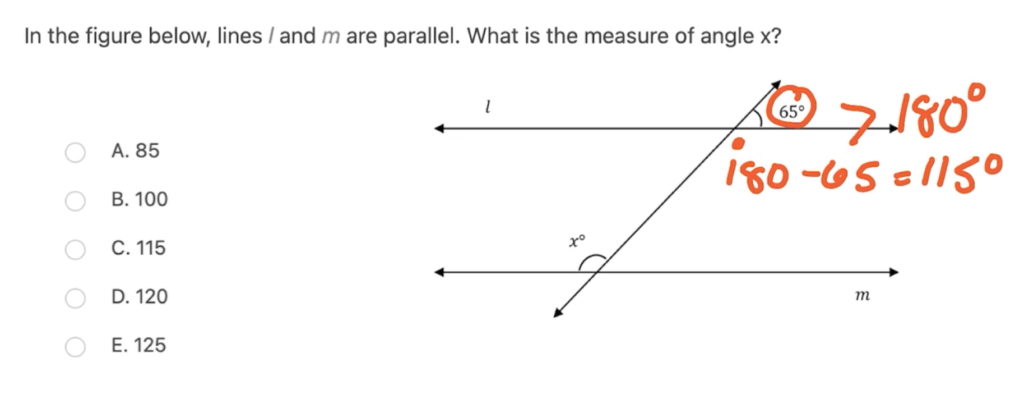
2. Choose The Best Study Program For You
You can find DAT books, like ‘DAT Quantitative Reasoning Prep 2022: The Most Comprehensive Review and Ultimate Guide to the DAT Quantitative Reasoning Test’.
It has over 2500 DAT Quantitative Reasoning practice questions, exercises on different topics from the section, and 2 full-length practice tests with detailed answers by DAT Math instructors and test experts.
Also, you can buy courses, like Kaplan DAT prep or DAT Bootcamp. They provide a wide variety of materials: videos, practice exercises, mock tests, and even one-on-one consultations with experts.
3. Make A Habit Of Practicing Every Day
The best way to practice productively is to study daily and break up the content into short chunks. So, do all tests and look through them several times to memorize the strategies.
We recommend allocating hours to study mathematics, focusing on parts you have problems with.
4. Practice The Concepts And Theories
We recommend studying math in stages. First, start from the elementary arithmetics and then move to more complex math concepts.
This way, concepts you’ve learned will have a logical sequence, allowing you to grasp the main ideas much easier, therefore building your confidence in the long run.

5. Find Your Way
There are several methods to prepare for math. You can attend prep classes, read study materials, or hire a tutor if you are better off with a one-on-one session.
Beware that the last option is costly. So choose what fits you best, depending on your confidence and readiness.
6. Do Mock Tests
Once you learn the content, practice it immediately. This will help you to comprehend the material you’ve learned. You can find mock tests in many books and online.
Do mock tests every day and follow the timing to get used to the fast pace of the test.
7. Memorize Formulas
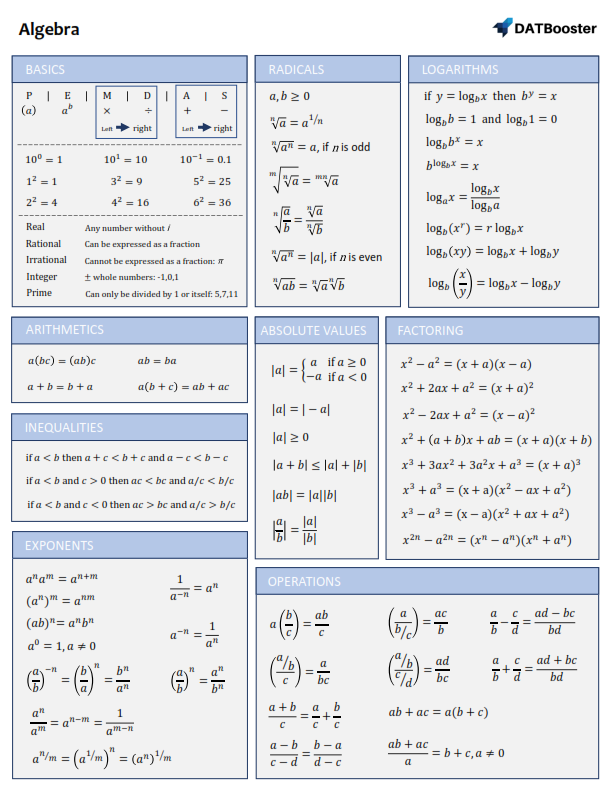
You’ll get a few equations for this section, so you’ll have to remember the rest yourself. Note that you’ll have limited time, so knowing as many formulas as possible will be an asset.
You won’t have much time to think over it, so knowing the formulas means being ready for the test.
8. Get Ready For The Exam
Wear something you feel comfortable in, like sneakers, jeans, etc. And, make sure you don’t study hard the day before the exam to not overload yourself.
Instead, revise all necessary information and look through the tasks to remember strategies and formulas.
DAT Quantitative Reasoning Test-Taking Strategies
Although the Quantitative Reasoning section is the last one, you still need to be attentive. Here are some strategies to tackle this part:
a) Instead of doing each task one by one, work backward from the answers to find the best options or pick some numbers instead of variables. By the way, this strategy is similar to the elimination method used in other DAT sections.
b) As you have limited time, it’s better to guess and pass the most complicated questions. Mark them and move on. Then, once you have time, go back to them and try to answer them.
c) Despite the time limits, don’t panic and don’t rush. If you don’t know the answer to some questions and have no time, just guess and pass.
d) Don’t leave any questions unanswered because they will be counted as wrong. So if you guess, you’ll have a chance to mark the correct answers.
e) We highly recommend going through numerous Quantitative Reasoning practice tests to know what to expect on the test day. This way you’ll feel more confident during the test itself.
FAQs About DAT Quantitative Reasoning
How Hard Is DAT Quantitative Reasoning?
DAT Quantitative Reasoning isn’t so hard.
However, it’s tricky because it has limited timing and it’s the last part of the exam.
What Is In The DAT Quantitative Reasoning Section?
The DAT Quantitative Reasoning section has 40 multiple-choice questions on the following topics:
- Algebra
- Numerical calculations
- Conversions
- Probability and statistics
- Geometry
- Trigonometry
- Word problems
How Can I Improve My DAT Quantitative Reasoning Score?
You can improve your DAT Quantitative Reasoning score by practicing daily, revising all math concepts from the easiest to hardest, memorizing formulas, and doing mock tests as much as possible.


